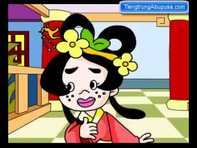|
Liệt Tử 列子 (LT) was very poor and routinely had to endure thirst and hunger.
Someone reported to the king about LT, saying that LT was a superior person and yet destitute. If others heard about him, they would think that the king did not recognize talented and virtuous subjects. The king immediately ordered three carts of food to be sent to LT. LT came out of the house, respectfully bowed to the emissary and declined the offer. Cảnh Công was a king in China during the Warring States. He had a favorite daughter who he wanted to give in marriage to his loyal general, Án Tử (AT).
One day, the king came to AT’s house for dinner. He took a look at AT’s wife and asked, “Is that your wife?” AT replied, “Yes, she is your Highness.” The king said, “Oh Dear, she looks so old and ugly! I have a daughter who is both young and pretty, I’d like her to come into your household to take care of you. Are you interested?” Zi Lu, a famous disciple of Confucius, asked the wise teacher, “The superior man has worries too?”
Confucius replied, “The superior man is only concerned with the task under consideration. When he hasn’t started yet, he’s happy that he has aspirations and resolve. After he completes the task, he is happy that he is competent and smart. Therefore, the superior only knows happiness and has no worries. In contrast, the small man, when he still hasn’t completed the task, he’s worried that he can’t. And if he’s successful, he’s afraid to lose it. That is why the small person only has worries his entire life.” Dương Chu (DC), a known scholar in China, stayed at an inn during one of his travels. The inn keeper had two concubines, one pretty and one ugly. The pretty one was not liked while the ugly one was well-liked. DC asked the resident children why. They said, “The pretty wife was aware of her beauty and therefore lost her appeal; we no longer saw her as pretty. Whereas the ugly wife was well aware of her lack of beauty and therefore compensated for it; thus we no longer see her as unattractive.”
Dương Hổ (DH) was a high ranking general during the Warring States era in China. He got in trouble and had to run for his life, taking refuge in a neighboring country. He asked to see a wise official Triệu Giản Tử (TGT) and declared, “From now on, I will never help anyone else.”
King Hoàn Công was reading. (He was known to be a very competent king during the Warring States in China.) His wood craftsman who was fashioning cart wheels came up to him and asked: “What is your Highness reading?”
The king replied: “I am reading up on the sages’ teachings.” “Are they still alive?” “No, they are all dead.” “Then, your Highness is only picking up rejects!” Tử Kích (TK) was rich and powerful official. He saw Điền Tử Phương (DTP), a poor but reputed scholar, and immediately descended his carriage to greet him. DTP ignored TK completely.
TK was upset and said, “The rich and powerful are entitled to slight others, can the poor and destitute afford to do the same?” An official observed the Confucian practice of making offerings to the ancestors. However, when making the offerings, he forgot to include his own son in the ceremony.
When Confucius heard of it, he commented, “This man will lose his official position within two years.” The official indeed lost his job a year later. Confucius’ disciples asked their teacher how he could see it coming. Part of the makeup of a good and meaningful life is righteousness. Righteousness is defined as the state of being morally right or justifiable. It is also known as virtue.
What do the ancients have to say about a righteous life? They say, “If each day, we can hear of one righteous thing, see one righteous thing being done and do one righteous thing, then that day would not have been in vain.” How can we teach our children about righteousness? To rely on our educators whose promotions are not based on teaching righteousness would be inadequate. The ancients said,
“There is nothing more skilled than practice: Therefore, children will be reminded to do their homework: that is their duty. Adults must patiently hone their skills in order to perfect them. There is nothing more peaceful than patience: Life is full of obstacles and challenges when we just want to be left alone. When we cannot run away from our problems and challenges, we must learn to patiently endure them: the storm will blow over. Chinese Emperor Yáo 堯 tried to talk ascetic Xǔ Yóu 許由 into taking over and rule the country. Xǔ Yóu simple left and went to mount Zhong Yue to continue his ascetic practice.
Later the emperor pursued him and again respectfully requested that Xǔ Yóu reconsidered. Xǔ Yóu got up abruptly and went to the nearby river to wash his ears. Meng Zi said, “A man steals a chicken from his neighbor every day. When told that is dishonest, he replied, ‘You are absolutely right! Unfortunately, I can’t quite stop. I tell you what: I’ll just take one chicken a day for now. I’ll stop after a year.’
Would such behavior be acceptable? We should fix our flaws as soon as we become aware of them!” A man found a jade stone in the mountain. He offered it up to the king of the country.
The king asked his jeweler to examine it and said it was not jade. The king therefore ordered that the man’s left foot be cut off as punishment. Then after the crown prince succeeded his father to the throne, that man offered up the jade stone to the new king. His jeweler proclaimed that it was not jade either. So, the new king ordered the man’s right foot be cut off as punishment. Zeng Zi’s wife was preparing to go to the market but their son cried and asked to go with her. So she said, “Stay home and be a good boy. When I come back I will give you pork for dinner.”
After she came back from the market, Zeng Zi told her to kill a pig for their meal. She said, “I did not mean it!” Zeng Zi replied, “How could you? Do not ever think that children don’t understand! Whatever parents do, they will imitate. If we lied to him, aren’t we telling him that it’s OK to lie?” So, Zeng Zi went and killed his pig and let his son have pork. Ma Vien grew up as an orphan. Life was very hard but he was undaunted. He used to tell his friends, “When you face great suffering, you should strengthen your resolve; when you become old, you should become even more unrelenting in your resolve.”
Therefore, Ma Vien worked very hard. He vigorously cultivated the fields, took great care of his animals and eventually became very wealthy. However, he did not rest on his laurels. He often told his friends, “Those who are rich should understand that they are to use their wealth to help the poor and unfortunate. Otherwise, they are just slaves to their wealth and would be wasting their lives guarding it. What’s so great about that? During the Warring States era in China, a man brought what he claimed to be an elixir of immortality to offer up to the king of the So country.
The gate keeper official asked the man, “Can it be eaten?” The man replied, “Yes, of course!” So, the official grabbed the potion and swallowed it. The king got upset and ordered the official be put to death by beheading. Parents can be ranked according to three criteria:
Confucius asked his disciple ZiLu, “What kind of man has wisdom? What kind of man is humane?”
ZiLu replied, “A wise man knows how to make others know you. A humane person knows how to make others love you.” Confucius said, “You are surely a man of learning.” The ancients taught:
When seeing a superior person, one should imitate him or her. When seeing an inferior person, one should examine oneself to make corrections. We should try our best to reinforce our righteousness and get rid of our faults. Those who criticize us appropriately are our teachers; those who praise us appropriately are our friends; and those who flatter us are our enemies. In ancient China, a commoner brought a gem to offer to an official. The official refused to accept. The man said,
“The jeweller informs me that it is a high quality gem. That is why I decided to offer up to you. It would be a great honor if you would accept it.” The official said, “You own an authentic gemstone. My lack of greed is also a gem. If I accept your gift then we’d both lose. Isn’t it better that you bring your gem back home, that way we both still have our treasures?”  In ancient China, in the country of Yue, there was a famously known beauty called XiShi 西施. She was so beautiful that even when she had a stomach ache, although she would bend over and grimace, she was still irresistible. In her village, there was woman who saw all that had happened. Because she was shallow and conceited, this woman assumed that she could win the hearts of all that saw her, just as XiShi did.  A jade craftsman went to the stone market and bought a stone. He broke it up and retrieved a block of jade. The jade is of the top-notch quality. As a result, the jade craftsman became very wealthy. The stone merchant who sold the stone heard of the story and felt that his stones must also contain jade. Therefore, he broke up all the stones in the shop looking for jade. Not only did he waste time and sweat, he ended up with useless stones without finding any jade and was scolded bitterly by his wife. * * * * * Zeng Zi 曾子 ranks amongst the top students of Confucius, second only to Yan Hui 顏回.
Zeng Zi was gravely ill and bed ridden. His son and another disciple was by his bed side. So was a young boy (who was typically called upon to fan him or fetch things). The boy said: “The straw mat [that Teacher is lying on], is very shiny and well made, is it for the great officials’ use?” Zeng Zi’s son immediately said: “Silence! Say no more!” Great men value their reputation and are not greedy for fame.
To value one’s reputation is to acquire knowledge and wisdom. One chooses to live by the principles of propriety (and not violate the rules and regulations). One decides to exemplify loyalty, self-respect, and bravery (and not fear loss or death). Layman Atula, who has 500 followers, brought them all to the monastery to hear the Dharma.
They first met with Ven. Revata who delighted in solitude. Ven. Revata did not even utter a single word. Extremely disappointed, Atula and his entourage went to see Ven. Shariputra and complained. As a result, the wise Shariputra immediately expounded in great detail the Abhidharma for them. Unfortunately, Atula could not quite grasp the profound principles. |
|
RELATED LINKS© 2010 – 2023 Chanpureland.org
|
SubscribeJoin our mailing list today!
|

 RSS Feed
RSS Feed